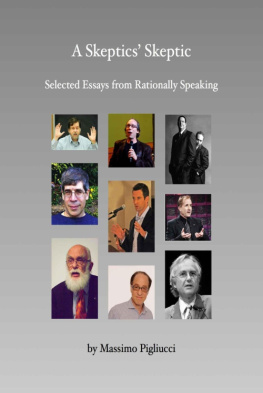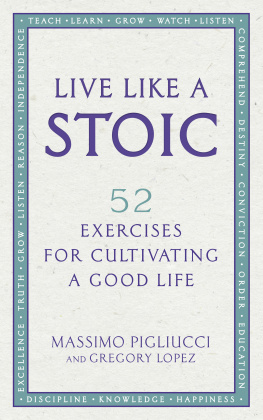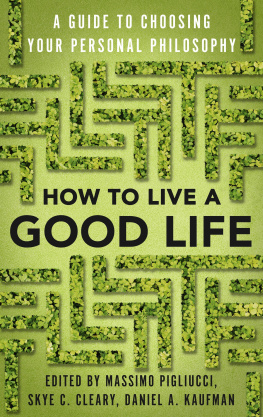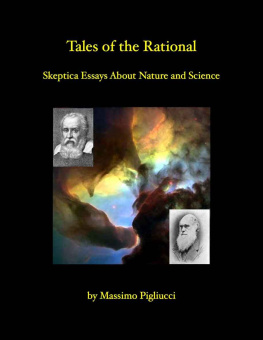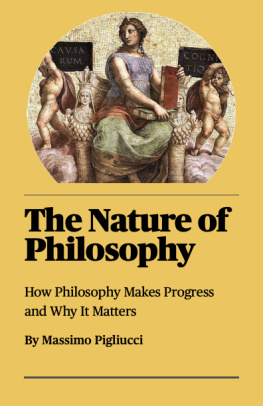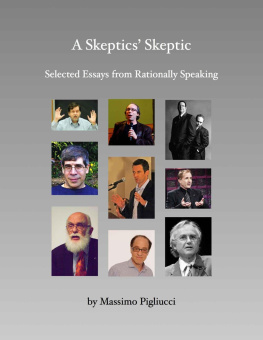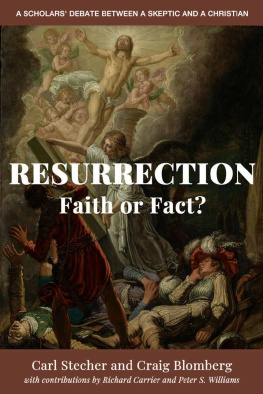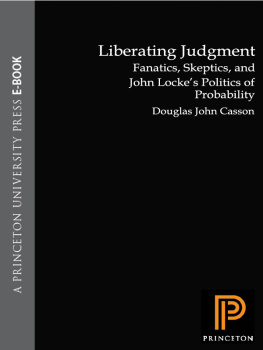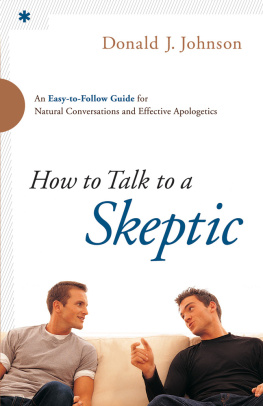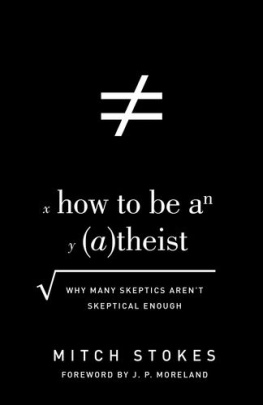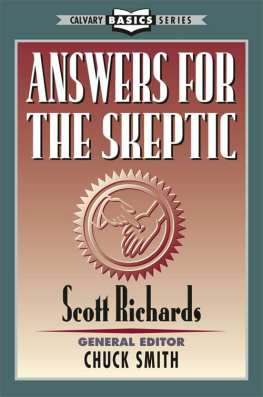A Skeptics Skeptic
Selected Essays from the Rationally Speaking blog series
By Massimo Pigliucci
Copyright by Massimo Pigliucci, 2013
Cover: The skeptics being criticized here (left to right and top to bottom): PZ Myers, Lawrence Krauss, Penn & Teller, Jerry Coyne, Sam Harris, Michael Shermer, James Randi, Ray Kurzeil, and Richard Dawkins.
Published by RationallySpeaking.org, New York, NY
Kindle Edition
About the Author:
Massimo Pigliucci has a Doctorate in Genetics from the University of Ferrara (Italy), a PhD in Evolutionary Biology from the University of Connecticut, and a PhD in Philosophy from the University of Tennessee. He has done post-doctoral research in evolutionary ecology at Brown University and is Professor of Philosophy at the Graduate Center of the City University of New York. His research interests include the philosophy of biology, in particular the structure and foundations of evolutionary theory, the relationship between science and philosophy, the relationship between science and religion, and the nature of pseudoscience.
Massimo is the Editor-in-Chief of the open access journal Philosophy & Theory in Biology . He has been elected fellow of the American Association for the Advancement of Science for fundamental studies of genotype by environmental interactions and for public defense of evolutionary biology from pseudoscientific attack.
In the area of public outreach, Massimo has published in national magazines such as Skeptic, Skeptical Inquirer, Philosophy Now, and The Philosophers Magazine, among others. He has also been elected a Fellow of the Committee for Skeptical Inquiry. Massimo pens the Rationally Speaking blog, hosts the podcast by the same name, and publishes the 5-minute Philosopher videos on YouTube .
Other books and collections by Massimo Pigliucci:
Philosophy of Pseudoscience : Reconsidering the Demarcation Problem. Co-edited with Maarten Boudry, University of Chicago Press, 2013.
Science and Metaphysics : Selected Essays from Rationally Speaking. RationallySpeaking.org, 2013.
Answers for Aristotle : How Science and Philosophy Can Lead Us to A More Meaningful Life. BasicBooks, 2012.
Blogging as a Path to Self Knowledge . With Leonard Finkelman and David Johnson, RationallySpeaking.org, 2012.
Nonsense on Stilts : How to Tell Science from Bunk. University of Chicago Press, 2010.
Evolution - the Extended Synthesis . Co-edited with Gerd B. Mller, MIT Press, 2010.
Rationally Speaking : Skeptical Essays on Reality as We Think We Know It. RationallySpeaking.org, 2009.
Thinking About Science : Essays on the Nature of Science. RationallySpeaking.org, 2009.
Making Sense of Evolution : The Conceptual Foundations of Evolutionary Biology. With Jonathan Kaplan, University of Chicago Press, 2006.
Phenotypic Integration : Studying the Ecology and Evolution of Complex Phenotypes. Co-edited with Katherine Preston, Oxford University Press, 2004.
Denying Evolution : Creationism, Scientism, and the Nature of Science. Sinauer, 2002.
Phenotypic Plasticity : Beyond Nature and Nurture. Johns Hopkins University Press, 2001.
Tales of the Rational : Skeptical Essays About Nature and Science. Freethought Press, 2000.
Phenotypic Evolution: A Reaction Norm Perspective . With Carl D. Schlichting, Sinauer, 1998.
Contents
Part I. The Skeptics
: Bullshit!
, global warming and the meaning of skepticism
claim that science can answer moral questions
Genuinely puzzled: ?
. An annotated response to Michael Shermer
Part II. The Biologists
When scientists talk about religion
, then and now
who peddles pablum
, should we care?
Part III. The Physicist
: another physicist with an anti-philosophy complex
Part IV. The Nut job
: visionary genius or pseudoscientific crank?
Introduction: A Skeptics Skeptic
What? Another Rationally Speaking collection? So soon? What can I say, its summer, and I really like putting together these e-booklets of selected essays from the blog (this is the fifth, the second this year...). The one you are hopefully holding on your iPad, Kindle, smart phone or whatever is one that I had thought about for a long time before assembling it.
You see, Ive been writing about skepticism (meaning, taking a skeptical stance on pseudo-science, pseudo-philosophy, pseudo-politics, and a few other pseudos) since as far back as 1997, when I began organizing Darwin Day events at the University of Tennessee in Knoxville. From time to time, over the intervening 16 or so years, I found myself turning my gadfly-sh keyboard toward other skeptics, usually famous ones. The reason is that it seems to me that a community such as the skeptic / atheist / humanist (S/A/H, for short) one that prides itself in its intellectualism and openness to reason and evidence, ought to critically examine its own tenets and positions, especially when espoused by prominent members of said community.
Indeed, one of the gratifying things about being a skeptic is precisely that, by and large, we dont act like a church. We recoil from dogmas, and we dont ostracize dissenting members of our community, immediately rushing to build a new church down the street. Or do we? Well, okay, the recent history of the S/A/H community actually does sometimes eerily recall religious schisms and doctrinal disputes. Still, at least we dont burn people at the stakes, or launch fatwas against them!
The gentle reader will notice that several of the essays included in theSkeptics Skeptic collection are, ahem, quite ironic, even sarcastic at times, certainly more so than the typical Rationally Speaking post. There are reasons for that. To begin with, the people targeted here are Big Boys who can definitely take the heat (many are academics, and academics are selected for having a thick skin). Moreover, rest assured that they can (and have, in several cases!) fight back with equal or larger force. But the most important explanation for my above-average forcefulness here is that I take public intellectualism seriously, and these people are somewhat major public intellectuals. They influence countless others, and they therefore bear the responsibility of writing rigorously as well as clearly. When they dont (in my opinion, of course) I call them out.
It should go without saying, but Ill say it any way: contra persistent insinuations to the contrary (by, say, The Discovery Institute, the inane think tank that promotes Intelligent Design creationism), these and other writings by yours truly do not signal the beginning of a move away from my philosophical naturalism, support for science, or defense of reason. They are simply cases in which I deploy precisely those tools to engage the best minds of the S/A/H, so that we as a broader movement can keep Carl Sagans famous candle in the dark alit against the always numerous and always powerful forces of obscurantism and repression.
cheers,
Massimo Pigliucci
Manhattan, Summer 2013
Part I. The Skeptics
Dear Penn and Teller: Bullshit!
(originally published on 24 September 2009)
I like Penn & Teller, the magicians and debunkers of pseudoscience and general inanity. I regularly use clips from their show in my critical reasoning class, despite cringing every time Penn indulges in his fuck this and motherfucker that exercise in free speech (it distracts the students from the real point, not to mention the always lurking possibility of an administrator asking me about the appropriateness of foul language in a philosophy class). Heck, I even recently went to Vegas to see them in person, had a photo taken with Teller, and managed to tell him (to his surprise) about how my students enjoy stimulating discussions triggered by the duos antics.
But as we have learned recently from the Atheist Alliance / Dawkins Foundation / Bill Maher fiasco, skepticism is sometimes too broad a label, as someone can be properly skeptical in politics but not about pseudoscience (Maher), while someone else may be great at debunking astrology and magnetic therapy, and yet also unable to shed some huge blinders when it comes to politically charged issues. The latter is, unfortunately, P&Ts case, as made excruciatingly clear by the 2008 (season 6) episode Being Green of Bullshit! I just watched it last night, and I found myself wanting to call up Penn to let go a few expletives of my own. Fortunately, I dont have his phone number.
Next page
